Ten Tokyo Tech students visited Thailand from August 22 to September 1 as participants in the Tokyo Tech-Asia Young Scientist and Engineer Advanced Study (AYSEAS) 2016 program.
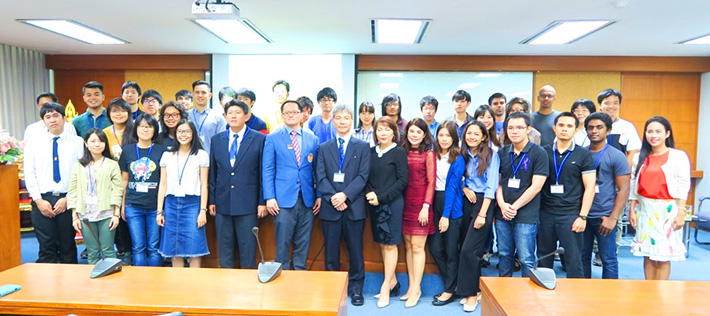
At King Mongkut's Institute of Technology Ladkrabang, the host university for AYSEAS 2016
- 1.
- Program overview
- 2.
- Program schedule
- 3.
- AYSEAS 2016 participating universities
- 4.
- Participants' experiences
1. Program overview
Tokyo Tech-AYSEAS is a joint study program organized annually for students from universities in Japan, Indonesia, the Philippines, Thailand, Singapore, and Vietnam. Through site visits, discussion, and communication with students with different backgrounds, participants have the opportunity to learn and experience the dynamism of rapidly growing Asian countries, focusing on technology, industry, education, and governance.
King Mongkut's Institute of Technology Ladkrabang in Thailand was the program host for AYSEAS 2016. Participating universities for 2016 also included King Mongkut's Institute of Technology Thonburi, Universitas Gadjah Mada (Indonesia), De La Salle University (Philippines), Ho Chi Minh City University of Technology (Vietnam) and Nanyang Technological University (Singapore).
In addition to the Tokyo Tech delegation, twenty students from the partner universities participated in the program, which was organized around visits to leading Thai and Japanese companies, as well as the National Science and Technology Development Agency of Thailand, and UNESCO Bangkok. Participants learned about the latest technologies employed in Thai industry and about the relationships between ASEAN countries and Japan.
Each day, students applied the knowledge they had acquired through the visits to discussions on possible solutions to various challenges in Thailand. Discussing trade-offs faced by Thai society as the nation achieves economic growth, small groups of participants focused on issues such as the traffic jams resulting from increased motorization and the effects of technology transfer on business growth. The students then worked together to conduct group presentations on these topics on the last day of the program.
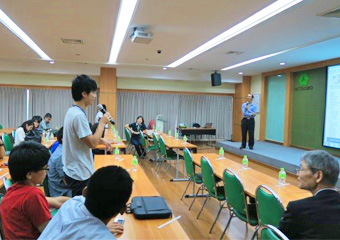
Company visit
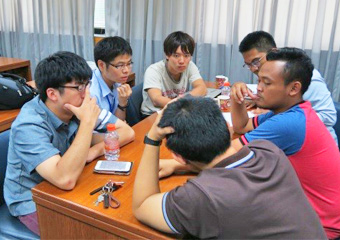
Group discussion
One highlight of the AYSEAS program is the opportunity for students to learn about the histories and cultures of Southeast Asian countries through cultural exchanges and visits to UNESCO World Heritage Sites. In Thailand, participants visited the historic city of Ayutthaya.
The program provided participants with opportunities not only to get a firsthand view of Thailand's fast-growing industries but also to learn the importance of mutual understanding through collaboration with peers of different nationalities, cultures, and religions. By working toward common goals and sharing accommodation and meals, the students developed strong bonds of friendship while building valuable intercultural and communication skills that will undoubtedly be recognized by future employers.
x
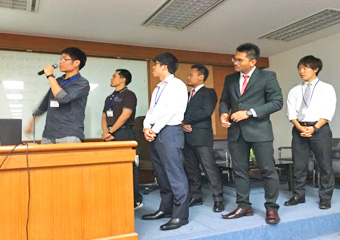
Final group presentations in Thailand
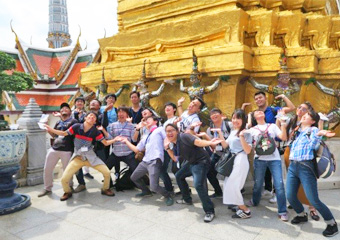
At Wat Phra Kaeo
A debriefing session was held at Tokyo Tech on November 9. Presenting more in-depth versions of the presentations they had made in Thailand, Tokyo Tech's participants discussed their experiences in the program. After the presentations, Executive Vice President for Education and International Affairs Toshio Maruyama presented each student with a certificate of program completion.
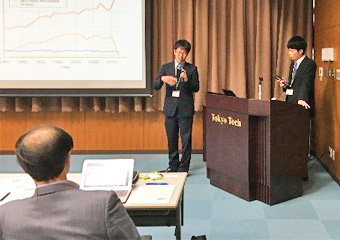
Final presentation session
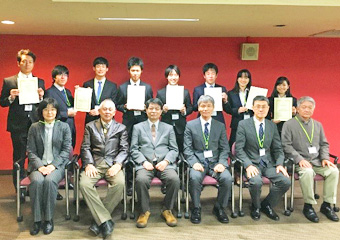
Group photo after the awarding of certificates
2. Program schedule
June - July |
Preparatory studies (lectures by professors in English, lecture on Thai language and culture, visit to Nippon Steel & Sumitomo Metal Corporation Kimitsu Works, and pre-departure research and presentations) |
Summer Holiday |
Independent study by participants |
Aug. 22 |
Arrival in Thailand |
Aug. 23 |
Opening ceremony and campus tour of King Mongkut's Institute of Technology Ladkrabang
Visit to Mitsubishi Elevator Asia and ice breaking session |
Aug. 24 |
Visit to National Science and Technology Development Agency (NSTDA)
Visit to Nissan Motor Asia Pacific Co., Ltd. |
Aug. 25 |
Visit to Summit Auto Body Industry, Co. Ltd.
Visit to Akebono Brake (Thailand) |
Aug. 26 |
Visit to UNESCO Bangkok
Briefing session on Tokyo Tech's international programs |
Aug. 27 |
Visit to the Grand Palace, Wat Phra Kaeo, Wat Pho, Wat Arun |
Aug. 28 |
Visit to Ayutthaya |
Aug. 29 |
Visit to Betagro Foods International |
Aug. 30 |
Cultural exchange |
Aug. 31 |
Final presentations and closing ceremony in Thailand |
Sep. 1 |
Return to Japan |
Nov. 9 |
Debriefing and presentation session at Tokyo Tech, reception |
3. AYSEAS 2016 participating universities
- Japan
: Tokyo Institute of Technology
- Thailand
: King Mongkut's Institute of Technology Ladkrabang (host university), King Mongkut's University of Technology Thonburi
- Indonesia
: Universitas Gadjah Mada
- The Philippines
: De La Salle University
- Vietnam
: Ho Chi Minh City University of Technology
- Singapore
: Nanyang Technological University
4. Participants' experiences
Yumi Iida
3rd* year, Mechanical Engineering
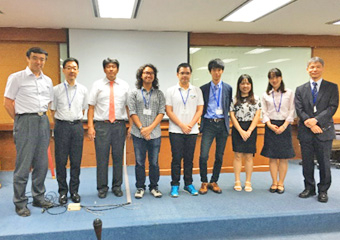
Iida (second from right) with group members
I would like to recommend this program to all students who want to study abroad, but especially to those who have been overseas before and are looking for the next step to challenge themselves in another country. I had already been to Australia on a short-term study abroad program when I came across AYSEAS while looking for my next challenge.
In this program, participants come from Japan and overseas, and I think this is the highlight of AYSEAS. We were teammates and roommates, and we learned and grew together irrespective of our home countries. Thai students welcomed us and taught us about Thai culture and daily life. When we visited companies, we learned together on the same footing, and we taught each other about our countries.
The AYSEAS program is full of opportunities to actively express our opinions. When we visited companies, we deepened our understanding by asking questions during and after the explanations and factory tours. We discussed social problems and other topics and made presentations about what we discussed. Each group was composed of students from several countries, so of course we did the presentations in English. Presentations are tough even in Japanese, so this was a real challenge for me. I strongly feel that the point of the AYSEAS program is not just learning English, but using the language as a tool to express what we are thinking.
I really appreciate the AYSEAS program as it provided many precious opportunities. I wanted to improve my English and communication skills, and the professors and staff members gave us a lot of advice. I learned a lot from the other students too. I will never forget the last night, when we went to karaoke and sang songs from various countries. We gathered again after we came back to the hotel and sang until the morning. When we sang the song "Graduation" by Vitamin C, I could see our group graduating from the AYSEAS program, very much like in the song. As the song goes, "we will still be friends forever." I will treasure my connections with the people I met through the AYSEAS program.
Taro Ichii
3rd* year, Metallurgical Engineering
The AYSEAS program has two main advantages. The first is that we learn the current situation of a developing country. The second is that we can interact meaningfully with students from other countries.
In our AYSEAS program, we went to Bangkok, Thailand and visited various companies and organizations, including a domestic company that makes parts for the automotive industry. We learned that all technology used at the company is transferred from a Japanese company. As a result, the Thai company has found it difficult to innovate the technology, and they have had to expand their business to other areas such as hotels and golf courses. There are many companies in Thailand in the same situation, and therefore it might be a challenge for Thailand to develop their economy effectively. In our final presentation, we discussed how to achieve technology transfer with economic growth for both countries.
We also visited Japanese companies with branches in Thailand. Japanese technicians working in these companies looked so satisfied with their work environment that I added one more option for my future career: working as a technician in an Asian country. We also learned that wages for Thai workers are gradually increasing according to the economic growth in Thailand.
In our downtime, we went to some markets. They were very clean, and the atmosphere was lively. The merchants were much more active than in Japan, and the price of food and goods was so cheap that we couldn't stop buying. The same can be said for the restaurants.
The interaction with students from other countries was very important. During our 11-day trip, we communicated a lot. I could only speak English, even at parties and in my room, because my roommate was Thai. My English skills dramatically improved. We became such good friends that we keep in touch now through SNS. Some friends are now in Japan or going to come to Japan, so I am planning to show them around.
I would like to say thank you to all the people who arranged the AYSEAS program, especially Professor Katsunori Hanamura, our director, and Mr. Takashi Konno, our student leader.
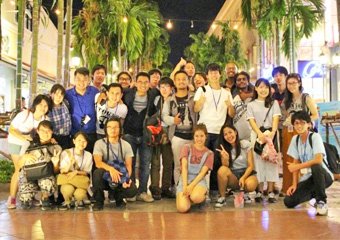
At the market
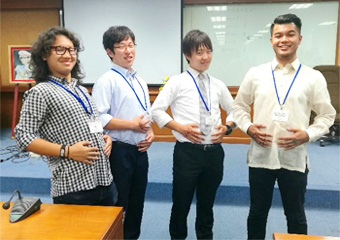
Ichii (second from right) with other students
Tetsuro Ohta
3rd* year, Chemistry
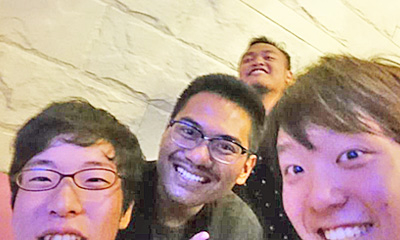
Ohta (left) with AYSEAS participants at karaoke
AYSEAS was my first stay in a foreign country. I had two reasons to join this program: improve my English skills and communicate with students from other countries.
I hoped this program would be a good opportunity to gauge my English ability. I didn't think that my English would develop significantly in only ten days, but there were preparatory studies in addition to the stay in Thailand. I had a lot of time to use English before the program. In addition to the pre-departure study, I joined lunch discussion sessions at Tokyo Tech's International Communications Space and talked with other Japanese students in English. At the beginning of the stay in Thailand, I could only listen to students' conversations. Then I decided to speak simple English, not in full sentences but just using phrases and words, and they understood, so I was very relieved. I ate meals with only foreign students in the latter part of the program. As a result, I gained plenty of self-confidence and a much better understanding of my English language ability.
My second reason for participating was communication with foreign students. The enthusiasm of the other students was very stimulating. They were interested in everything! They asked many questions during the company visits and asked me questions about Japan. They studied hard and were positive. I made many friends. At night, we played cards and enjoyed drinks together. I had a very happy time.
This program was often very tough for me, but I am sure that it made me stronger. I will treasure it for the rest of my life.
- *
- At the time of participation
. Any information published on this site will be valid in relation to Science Tokyo.













